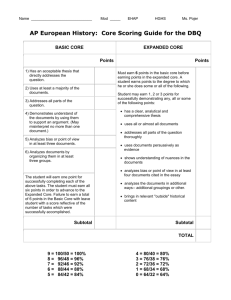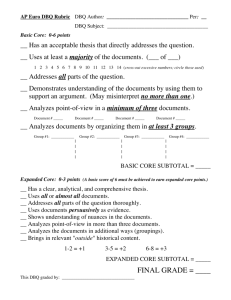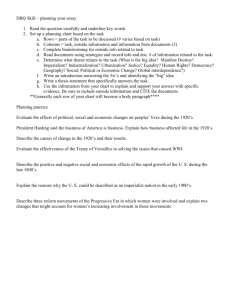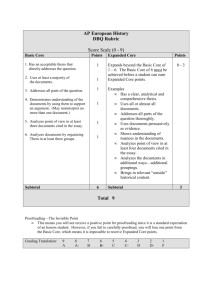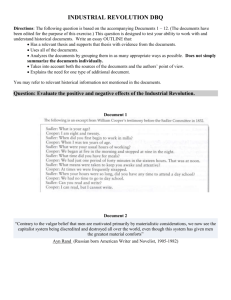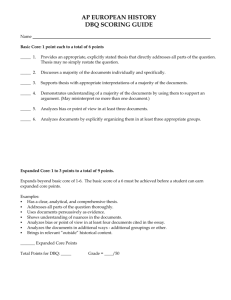DBQ Essentials
advertisement
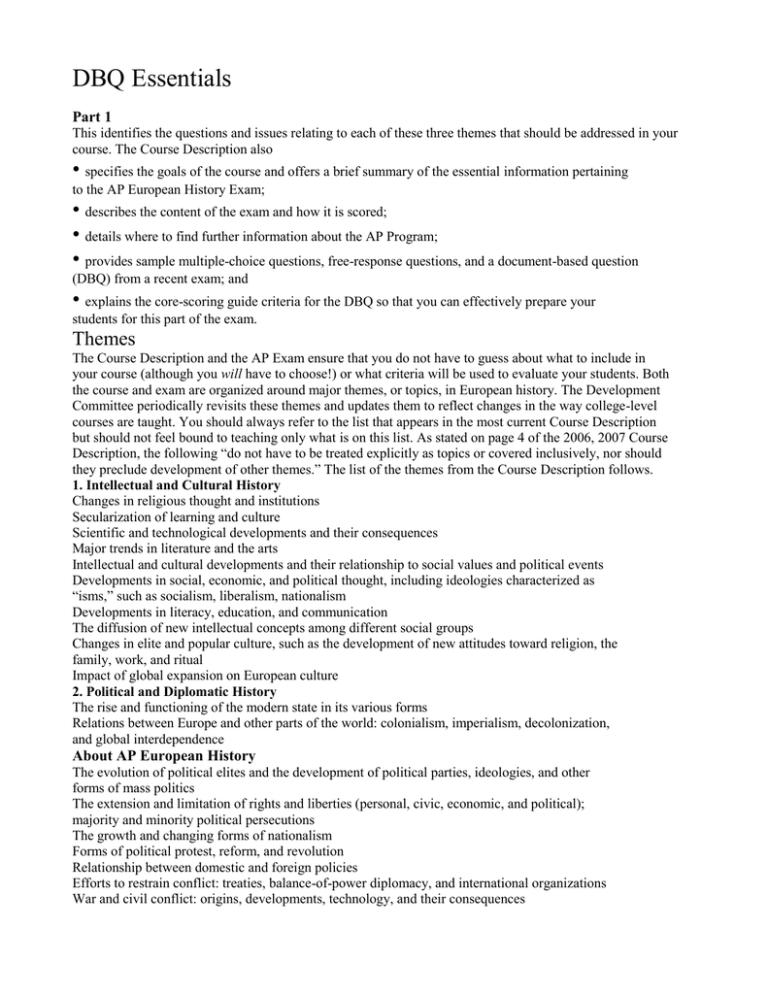
DBQ Essentials Part 1 This identifies the questions and issues relating to each of these three themes that should be addressed in your course. The Course Description also • specifies the goals of the course and offers a brief summary of the essential information pertaining to the AP European History Exam; • describes the content of the exam and how it is scored; • details where to find further information about the AP Program; • provides sample multiple-choice questions, free-response questions, and a document-based question (DBQ) from a recent exam; and • explains the core-scoring guide criteria for the DBQ so that you can effectively prepare your students for this part of the exam. Themes The Course Description and the AP Exam ensure that you do not have to guess about what to include in your course (although you will have to choose!) or what criteria will be used to evaluate your students. Both the course and exam are organized around major themes, or topics, in European history. The Development Committee periodically revisits these themes and updates them to reflect changes in the way college-level courses are taught. You should always refer to the list that appears in the most current Course Description but should not feel bound to teaching only what is on this list. As stated on page 4 of the 2006, 2007 Course Description, the following “do not have to be treated explicitly as topics or covered inclusively, nor should they preclude development of other themes.” The list of the themes from the Course Description follows. 1. Intellectual and Cultural History Changes in religious thought and institutions Secularization of learning and culture Scientific and technological developments and their consequences Major trends in literature and the arts Intellectual and cultural developments and their relationship to social values and political events Developments in social, economic, and political thought, including ideologies characterized as “isms,” such as socialism, liberalism, nationalism Developments in literacy, education, and communication The diffusion of new intellectual concepts among different social groups Changes in elite and popular culture, such as the development of new attitudes toward religion, the family, work, and ritual Impact of global expansion on European culture 2. Political and Diplomatic History The rise and functioning of the modern state in its various forms Relations between Europe and other parts of the world: colonialism, imperialism, decolonization, and global interdependence About AP European History The evolution of political elites and the development of political parties, ideologies, and other forms of mass politics The extension and limitation of rights and liberties (personal, civic, economic, and political); majority and minority political persecutions The growth and changing forms of nationalism Forms of political protest, reform, and revolution Relationship between domestic and foreign policies Efforts to restrain conflict: treaties, balance-of-power diplomacy, and international organizations War and civil conflict: origins, developments, technology, and their consequences 3. Social and Economic History The character of and changes in agricultural production and organization The role of urbanization in transforming cultural values and social relationships The shift in social structures from hierarchical orders to modern social classes: the changing distribution of wealth and poverty The influence of sanitation and health care practices on society; food supply, diet, famine, disease, and their impact The development of commercial practices, patterns of mass production and consumption, and their economic and social impact Changing definitions of and attitudes toward social groups, classes, races, and ethnicities within and outside Europe The origins, development, and consequences of industrialization Changes in the demographic structure and reproductive patterns of Europeans: causes and consequences Gender roles and their influence on work, social structure, family structure, and interest group formation The growth of competition and interdependence in national and world markets Private and state roles in economic activity Scoring a DBQ The European History Development Committee strongly urges teachers to ensure that students are familiar with and capable of meeting the following requirements: This is what you have to do to get 6 points of 9 points on the DBQ. If you do not get these six, you can not get a 7,8, or 9. • Providing an appropriate, explicitly stated thesis that directly addresses all parts of the question and does NOT simply restate the question • Discussing a majority of the documents individually and specifically • Demonstrating understanding of the basic meaning of a majority of the documents • Supporting the thesis with appropriate interpretations of a majority of the documents • Analyzing point of view or bias in at least three documents • Analyzing the documents by explicitly grouping them in at least three appropriate ways CORE SCORING GUIDE APEH DBQ (Note to AP teachers: The changes for the 2006-7 exams are shown in red. This page was updated June 20, 2005.) BASIC CORE 1-6 1 Student may earn up to 6 points for mastery of these items. Provides an appropriate, explicitly stated, thesis that directly addresses all parts of the question. Thesis may not simply restate the question. Discusses a majority of the 2 documents individually and specifically. Demonstrates understanding of the basic meaning of a majority of 3 the documents (may misinterpret no more than one). Supports the thesis with 4 appropriate interpretations of a majority of the documents. Analyzes point of view or bias in 5 at least three documents. Analyzes documents by explicitly 6 organizing them in at least three appropriate groups. The student will earn one point for successfully completing each of the above tasks. The student must earn all six points in order to advance to the Expanded Core. Failure to earn a total of 6 points in the Basic Core with leave student with a score reflective of the number of tasks which were successfully accomplished. Expanded Core Must earn 6 points in the basic core before earning points in the expanded core. A student earns points to the degree to which he or she does some or all of the following. has a clear, analytical and comprehensive thesis uses all or almost all documents addresses all parts of the question throughly uses documents persuasively as evidence Student may earn 1, 2 or 3 points for successfully demonstrating any, all or shows understanding of nuances in the some of the following points. documents analyzes bias or point of view in at least four documents cited in the essay analyzes the documents in additional ways-- additonal groupings or other. brings in relevant "outside" historical content Points earned in the expanded core, coupled with those earned in the basic score will equal the total score of the student. Note: a student may earn six points in the basic core and does not necessarily have to earn any additional points in the expanded care. This said, a six may stay a 6. TOTAL POSSIBLE SCORE IS 9
